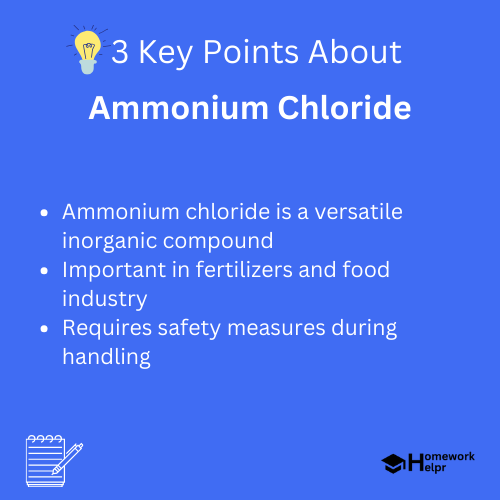📝 Summary
Ammonium chloride, or NH₄Cl, is an essential inorganic compound widely used in various industries. This white crystalline salt is highly soluble in water and is valuable for applications such as fertilizers, food additives, and medicinal syrups. Its ionic nature is crucial for its functionality, and it can be synthesized from ammonia and hydrochloric acid. While beneficial, care must be taken to mitigate its environmental impact and handle it safely due to potential irritation and respiratory distress. Understanding its properties is vital for effective use. }
Understanding Ammonium Chloride
Ammonium chloride, represented by the chemical formula NH‚ÇÑCl, is an important inorganic compound that is often used in various industries and laboratories. It is a white crystalline salt that is soluble in water, showing a high rate of dissolution when mixed with clear fluids. Its ability to form hydrogen bonds enhances its solubility in water, making it quite versatile for different applications.
Definition
Inorganic Compound: A chemical compound that does not contain carbon-hydrogen bonds.
Physical and Chemical Properties
Ammonium chloride exhibits various physical and chemical properties that contribute to its usability. Here are some key characteristics:
- Appearance: Ammonium chloride appears as a white, crystalline solid.
- Melting Point: It melts at about 338 °C (640 °F).
- Solubility: It is highly soluble in water but insoluble in alcohol.
When dissolved in water, ammonium chloride dissociates into ammonium (NH₄⁺) and chloride ions (Cl⁻). This dissociation is crucial because it highlights the ionic nature of the compound, which is essential for its various applications.
Applications of Ammonium Chloride
Ammonium chloride is utilized in various fields due to its unique properties. Here are some common applications:
- Fertilizers: It is widely used in agricultural fertilizers.
- Food Industry: As a food additive, it is known as E510 and is sometimes used in baking.
- Medicinal Uses: It can be found in some medicinal syrups and expectorants due to its ability to thin mucus.
- Electrolytes: It is used in dry cell batteries as an electrolyte.
Each of these applications takes advantage of either the ionic properties or the ability of ammonium chloride to interact with other substances.
Examples
In gardening, ammonium chloride can help provide crops with the necessary nitrogen they need for healthy growth.
How Ammonium Chloride is Prepared
The synthesis of ammonium chloride can occur via several chemical reactions. One common method involves the reaction between ammonia (NH‚ÇÉ) and hydrochloric acid (HCl). The reaction can be represented by the following formula:
NH‚ÇÉ + HCl ‚Üí NH‚ÇÑCl
Another method includes the reaction of sodium chloride with ammonia and carbon dioxide to yield ammonium chloride as a product. This is a critical reaction in industries where large amounts are consumed.
Definition
Sodium Chloride: A chemical compound commonly known as table salt (NaCl).
Environmental Impact
While ammonium chloride is safe for many applications, it is important to consider its impact on the environment. Overuse of ammonium chloride in agriculture can lead to soil acidification, which may adversely affect crop health and biodiversity. Thus, farmers must apply it judiciously to mitigate these effects.
❓Did You Know?
Ammonium chloride is sometimes used in fireworks due to its ability to produce beautiful colors when burned!
Safety and Handling
As with any chemical, appropriate safety measures should be taken when handling ammonium chloride. It can be mildly irritating to skin and eyes, so it’s important to wear safety goggles and gloves when working with it. If ingested or inhaled, it can cause respiratory distress, making proper ventilation and protective gear crucial during its usage.
Examples
In laboratory settings, fume hoods can help prevent inhalation of ammonium chloride dust.
Conclusion
In summary, ammonium chloride plays a pivotal role in various industries from agriculture to pharmaceuticals. Its crystalline form, solubility in water, and ionic properties make it a multi-faceted compound. Understanding its properties, uses, and safety precautions is important for anyone looking to work with or study this interesting compound. Whether as a fertilizer, a food additive, or a part of laboratory experiments, ammonium chloride has secured its place in both industrial and educational settings.

Related Questions on Ammonium Chloride
What is the chemical formula of ammonium chloride?
Answer: The formula is NH₄Cl.
What are the applications of ammonium chloride?
Answer: It‚’ used in fertilizers, food, and medicines.
How is ammonium chloride synthesized?
Answer: Commonly from ammonia and hydrochloric acid.
What safety measures should be taken?
Answer: Use gloves and goggles to prevent irritation.
